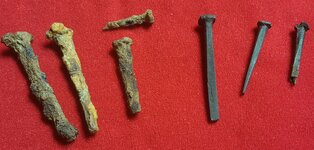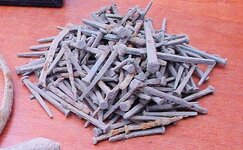Appalachianman76
Full Member
- Aug 22, 2016
- 192
- 209
- Detector(s) used
-
XP Deus
Garrett AT Pro
Garrett Pro-Pointer AT
- Primary Interest:
- All Treasure Hunting
I've been hunting a Civil War camp over the last month and have discovered a mystery in how some of the square nails have corroded. 99.9% of them show the normal corrosion of heavy rust to the point of "popcorning" (developing large incrustations with the surrounding soil and minerals) and even dissolving away. However, I've found three square nails from the same depth and time period that show little or no corrosion at all. They're almost like new! What's really weird is that half of the nail on the far right rusted away while the top half remained in great condition.  I've posted a picture below showing the normal examples and the abnormal ones. All the nails have been cleaned by washing in hot soapy water with a toothbrush to get the dirt off (No electrolysis). These came from heavy clay soil on the top of a hill with no water around. Does anybody have a good explanation on how this can happen? How can a nail that is 150 years old not rust? Thanks for the thoughts.
I've posted a picture below showing the normal examples and the abnormal ones. All the nails have been cleaned by washing in hot soapy water with a toothbrush to get the dirt off (No electrolysis). These came from heavy clay soil on the top of a hill with no water around. Does anybody have a good explanation on how this can happen? How can a nail that is 150 years old not rust? Thanks for the thoughts.

 I've posted a picture below showing the normal examples and the abnormal ones. All the nails have been cleaned by washing in hot soapy water with a toothbrush to get the dirt off (No electrolysis). These came from heavy clay soil on the top of a hill with no water around. Does anybody have a good explanation on how this can happen? How can a nail that is 150 years old not rust? Thanks for the thoughts.
I've posted a picture below showing the normal examples and the abnormal ones. All the nails have been cleaned by washing in hot soapy water with a toothbrush to get the dirt off (No electrolysis). These came from heavy clay soil on the top of a hill with no water around. Does anybody have a good explanation on how this can happen? How can a nail that is 150 years old not rust? Thanks for the thoughts.




